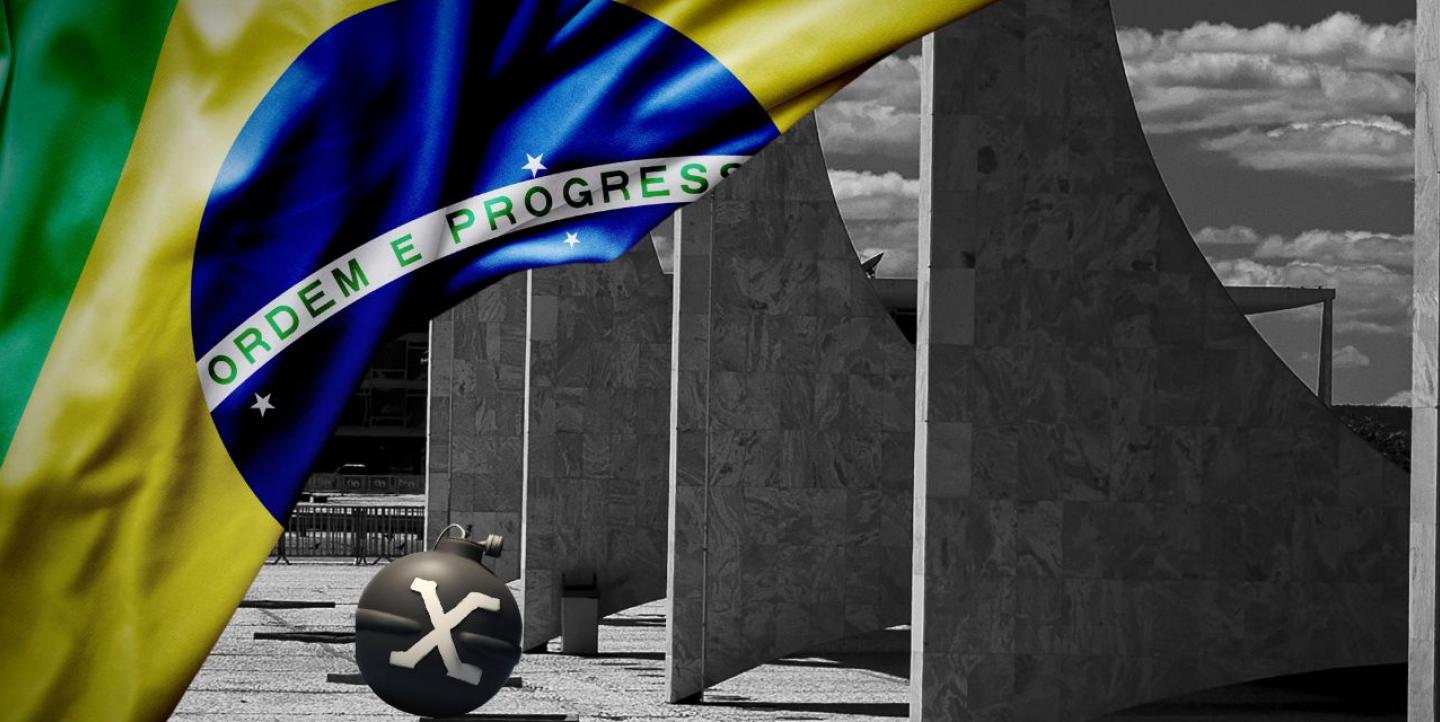In April, Elon Musk, the majority owner, chairman and CTO of X, set the Brazilian internet ablaze when he used his account on the platform to call Brazilian Supreme Court Justice Alexandre de Moraes a “dictator,” shortly after Moraes ordered that around a dozen X accounts with posts advocating for a coup in Brazil be suspended.
These suspended accounts reached thousands of people throughout Brazil’s 2022 presidential election season. Supporters of former President Jair Bolosonaro would proceed to attempt an insurrection on January 8, 2023.
Similar to the January 6, 2021 attack on the U.S. Capitol, attackers stormed and occupied the Brazilian Congress, the Supreme Court and the Presidential Palace, with the goal to overturn Bolsonaro's election loss by instigating a military intervention.
Several of the messages and videos posted to X by the accounts Moraes ordered suspended demanded a military coup and the murder of “communist” opposition leaders, to prevent the winning candidate, Luís Inácio Lula da Silva, from taking office.
These demands spread freely on X, even though calling for the armed forces to attempt a coup is a crime under Brazil’s Constitution, which was created in 1988 in the aftermath of two decades of bloody military dictatorship.
Baseless allegations
Following his first tweet against Moraes, Musk published a series of posts and reposts in early April accusing Moraes of "betraying the constitution" through an "aggressive censorship" that "appears to violate the law & will of the people of Brazil."
Musk even demanded for Moraes to be impeached. He also called him a "criminal" who was responsible for "the most draconian demands of any country on Earth." Musk said he would lift the restrictions on all the previously suspended accounts.
Musk further inflamed his followers by directing them to Twitter Files Brazil, a series of allegations made a few days prior by journalist Michael Shellenberger. Shellenberger had released email exchanges between X's legal team in Brazil and their colleagues in San Francisco discussing Moraes’ decision to suspend the accounts and lawsuits filed against other social media platforms in Brazil.
Shellenberger made two allegations against Moraes: that the Justice had ordered the suspension of a set of X accounts while asking for the platform to pretend the decision was theirs; and that he had threatened to arrest X's attorney in Brazil should the platform not provide the court with users' personal data.
That same weekend, Moraes opened an inquiry into Musk and reiterated his order to keep the accounts suspended or else X would be required to pay a fine. This prompted Musk to level up his attacks on Moraes.
Eventually, even President Lula commented on the case, saying that Musk was interfering in Brazilian democracy.
Admitting the lack of evidence
Days after Shellenberger’s allegations spread in Brazil, he admitted Moraes had never threatened to arrest X's attorney in Brazil. On April 11, he posted to his X account: "CORRECTION: I'd previously written: 'Alexandre de Moraes and other government officials threatened to press charges against X's attorney in Brazil in case he didn't provide personal and private user data.' This is not correct. I don't have proof of Moraes trying to criminally charge X's attorney in Brazil."
The order for Twitter to hand over private user data was in fact made by the São Paulo State Public Prosecutor's Office while investigating a single X user for being a member of a Brazilian criminal organization, the PCC. The prosecutors ordered X to disclose the user’s information, but the company refused. The inquiry had no links with the Supreme Court nor with Justice Moraes.
The second allegation, which claimed that Moraes had asked Twitter to lie and say it was their decision to suspend accounts, was also debunked.
Shellenberger, it was revealed, was referring to a Moraes order from January 2023 at which time Moraes ordered the suspension of a dozen accounts. Moraes asked for the case to be held privately, a common proceeding in Brazil and other democracies for dealing with sensitive information in court. He did not ask Twitter to pretend the decision was theirs during this process.
The journalism piece behind the scandal was inherently flawed. But the Twitter Files had already damaged Brazil, by serving as a reason for right-wing representatives to prevent the passage of a bill seeking to regulate social media in the country similar to those introduced in the EU, Canada, Australia and the U.K.
What not to do in journalism
The authors behind the Twitter Files have continued to disseminate disinformation. On April 11, Shellenberger and Brazilian journalist David Ágape, who collaborated with Twitter Files Brazil, went before the Senate to testify about the allegations against Moraes.
From a political standpoint, Twitter Files Brazil was a huge success for the far right in the country. It captured the public's attention and helped to cast doubt on the Supreme Court’s legitimacy. Representatives and other political actors made use of the allegations to present Brazil as under the risk of dictatorship.
But from a news standpoint, this was a case to become an example in journalism schools on what not to do when conducting journalism: publishing allegations with a lack of evidence, to the benefit of those looking to undermine democratic institutions.
Photo by Gustavo Leighton on Unsplash, and Canva collage.
This article was originally published on IJNet Portuguese and translated by Priscila Brito.


